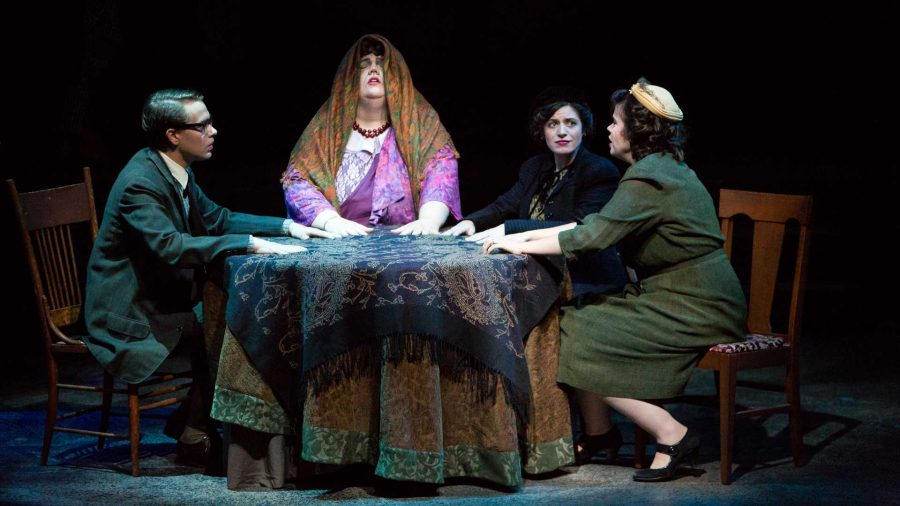Three parents gather in a eerie, cluttered attic apartment, holding hands at a table. They are here to hopefully communicate with the spirits of their deceased kids. A medium is their only hope of having the opportunity to talk with them. The only problem? The medium is a fake.
The Medium, a “Tragedy in Two Acts,” is being produced by the Opera Department of the School of Music, and it will begin its run at 7:30 p.m. today and continue through Oct. 15 at the Coralville Center for the Performing Arts, 1301 Fifth St.
The opera was written by Gian Carlo Menotti and follows the story of a medium and her two kids, who help her run her operation. That involves her pretending to be the titular medium and manipulating parents of deceased children in order to make her money. When the parents come, she has her own kids pretend to be the kids’ ghosts. The plan works until the medium actually hears ghosts, and chaos ensues.
The show had its world première at the Brader Matthews Theater at Columbia University on May 8, 1946. Monica was played Evelyn Keller, Leo Coleman as Toby, and Madame Flora played by Claramae Turner.
Bill Theisen directed the local production, with William LaRue Jones as the conductor. Theisen wanted to bring the production to Iowa so the audiences would become more familiar with the work of Menotti. He was an Italian-American composer and librettist best known for aAmahl and the Night Visitors, which is often performed around Christmas. It was the first televised opera in America in 1951.
Theisen, an advocate for 20th- and 21st-century American opera, said he thought it was important that the students be exposed to this influential composer.
“[Menotti] was really innovative,” he said. “He was the first to write an opera exclusively for radio, the first to write one exclusively for television back in the ’50s and ’60s and he was breaking ground in many important ways.”
For Theisen, it was about bringing a much more streamlined storytelling to opera audiences, as opposed to the sometimes-loftier older operas. A large portion of the accessibility was due to its being in English.
“It’s really accessible to the audience,” he said. “There certainly are these grander versions, but this is what you call a chamber opera. It’s a very small, intimate opera, it’s very theatrical. It’s so much more about the storytelling … Many pieces that have been written in the past 50 years are based on classics, whether American or international.”
The conductor of the chamber orchestra behind the music of the production said every opera presents unique challenges for conductors.
“They combine concerns for actors’ vocal production with their dramatic staging, which requires a conductor to execute accurate timing for character portrayal and correct music tempos,” Jones said.
While including the orchestra in the production (some productions only use a piano as accompaniment) is a challenge for both the director and the conductor, it ultimately pays off in the final productions.
“Adding the orchestra in is like adding another character,” Theisen said. “It really brings in a lot of different colors … Often, the piece is done with a piano because it is a smaller piece, but adding the orchestra is adding a whole other color, a whole other character to the piece. So I love having the full orchestration, which isn’t always the case.”
San Francisco Classical Voice described the opera in a 2015 article titled “Menotti’s The Medium Shows Power in Silence” through the use of silence, which is prominently seen in the character Toby, a mute boy who lives with Madame Flora and her daughter Monica.
“Silence is music’s secret weapon,” the article said. “The notes unplayed or sung — in rests, phrase endings, rubatos stretched to transparent thinness — can amplify and intensify anything around them. What isn’t there holds the power to transform what is … Everything that happens in this brilliantly perverse piece pivots around Toby’s febrile, tragic stillness.”
Ultimately, the opera is about the supernatural and what happens when people encounter the limits of their beliefs and are introduced to the unfamiliar. It is described by the composer himself as a “supernatural opera experience,” a combination of a ghost story and a supernatural thriller. One that promises to haunt those who see it.
What: The Medium — A Tragedy in Two Acts
When: 7:30 p.m. Friday & Saturday, 2 p.m. Oct. 15
Where: Coralville Center for Performing Arts, 1301 Fifth St



